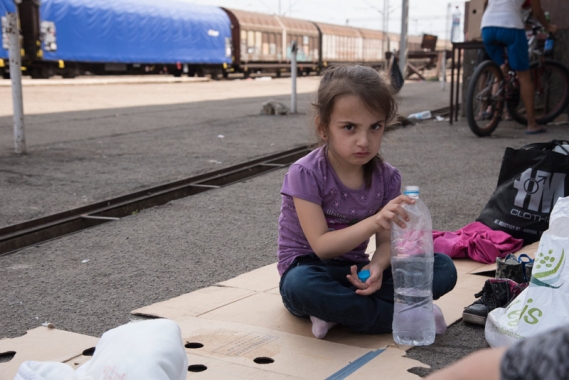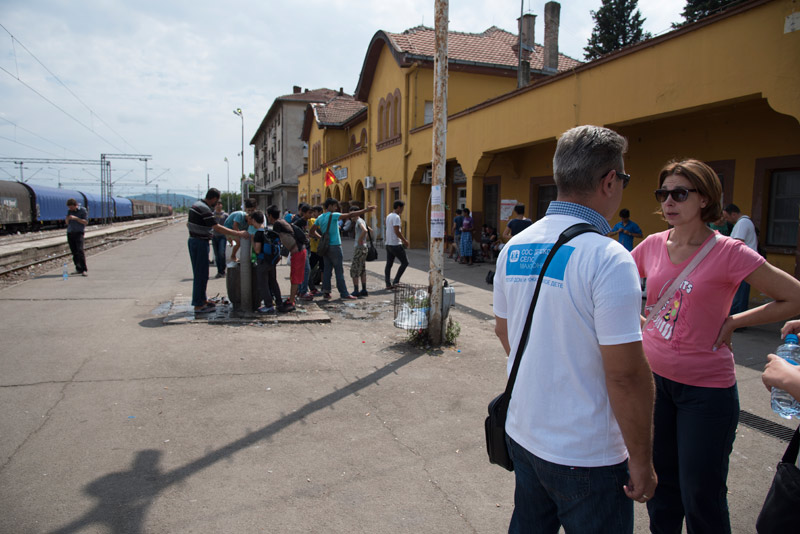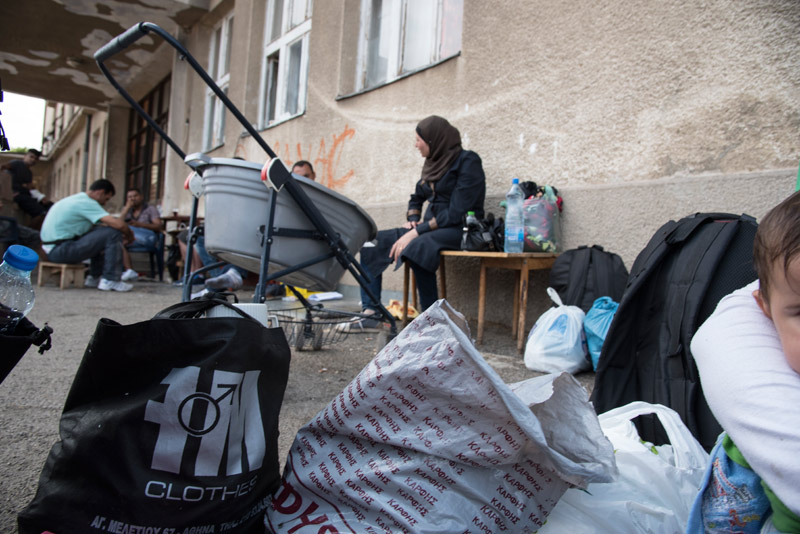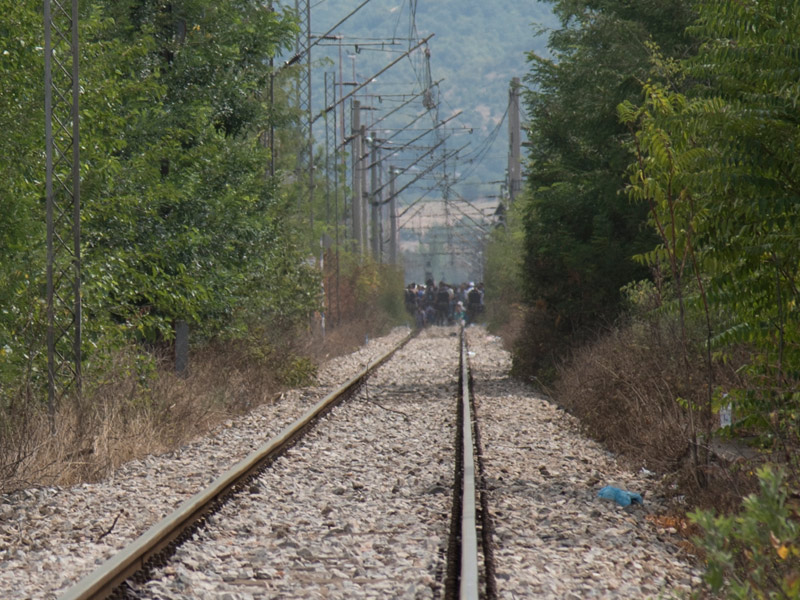The Distant Screams

"Don't drink the water!" I hear as I drench my thirst at a fountain in a public park in Gevgelija. I turn around and see two boys who explain, "The refugees washed their feet in it just now."
"Ah, well, water under the bridge," I joke giving turn to my two companions who also didn't mind what apparently happened at the fountain.
The three of us - I, a colleague from SOS Children's Villages Macedonia and a representative of another organization - just came back from a long walk, though not nearly as long as the one taken by the people we came here for.
The opposite of normal
To describe the situation in Gevgelija, Macedonia's southern-most town at only three kilometers from the border with Greece, as alarming would be an understatement.
Until Wednesday the town with population of about 15.000 gave daily shelter to thousands of refugees fleeing Syria, Pakistan, Iraq, Afghanistan, Somalia . Normal life was discontinued. For everyone.
"You see the thermometer at that pharmacy?" one of my companions asks. "It's 36 degrees now. Couple of weeks ago it was 49 degrees. Then, there were around 4.000 refugees right here. Small children, families, elderly, injured people laying all over. It was unbearable for all."
The Macedonian Ministry of Interior Affairs reports that over 42,000 refugees entered the country legally over the summer at the Gevgelija border crossing. Activists of local NGOs estimate this would be about a third of the total number of refugees who passed through Macedonia.
 The halt
The halt
On 19 August 2015 the Macedonian Government declared a state of emergency on the country's southern and northern border allowing for deployment of special forces to guard the border lines preventing illegal crossings.
The spokesperson of the Macedonian Ministry of Interior Affairs stated the move enables controlled entry in the country and eases the boarding of trains and buses headed to the northern border with Serbia.
Starting 21 August 2015, the Macedonian police began allowing entry to several groups of refugees per day, about 200 at a time, only through police controlled crossings. Illegal entries still happen, NGO activists say.
On lunchtime Friday, there are about 50 people at the train station. A mother of three sits in the shade of the station building. She speaks no English, but with hand gestures and help of her friend who knows few English words, she allows me to join them and take snapshots of her children.
As kids are
Her two girls, age four and six, are suspicious for a second, then start happily posing. The four-year-old points at the camera. She wants to take pictures. Her model is her little six-month-old brother.
I ask the mother where are they from. She misunderstands and tells me, "Alemania". ""OK, Germany. But?" I say pointing backwards and waving my head. "Oh, Aleppo," she says tearing up.
I ask nothing for a while opting to play with the little girls. The younger one is ticklish and seems to enjoy it.
For a moment, I forgot where we were. The girls giggle, take pictures, ask their mom to hold the boy straight. They're really good photographers, too! As most children usually are.
Northbound
Using our, by now established, way of communication, the mother tells me that she got a food package containing baby formula. She gives me thumbs up that it's enough for a while as I squeeze the cutest little feet in the world.
The six-month-old baby boy looks at me indifferently. He doesn't mind neither my pinches nor the flies landing on his feet in swarms.
The mother tells me they want to board the 5 pm train. She doesn't want to leave the station in fear they'd miss it. "Alemania," she repeats.
Their next destination is Tabanovce, Macedonia's border with Serbia. Another train or bus will take them to the border with Hungary and, hopefully soon, to their ultimate destination.
 Children first!
Children first!
NGO activists on the ground say the first wave of refugees, several months ago, were mostly men. Most said they headed to Germany in order to settle in before getting their families to join.
A UNHCR representative says mostly people travel in large familial groups. Women are unwilling to take advantage of the privileged registration process, favouring pregnant women and mothers with children, in order not to be separated from their group.
The registration process at the Macedonian south border provides the refugees with a paper declaring intent to seek asylum in the country. This paper, valid for 72 hours, allows them to either cross Macedonia legally or seek asylum. Overwhelming majority chooses the former
option.
The UNHCR rep appeals for help to mothers and babies. "Baby formula is desperately needed. So are diapers and baby creams for rashes. Many of these mothers couldn't change the diapers in days."
Autumn is coming
A representative of a local NGO, Legis - who've been on the ground since day one and know the refugees' needs well, adds, "Space blankets! The weather becomes rainy and colder. People can use such blankets to cover themselves, or as sleeping mats, or for diaper change."
He adds that raincoats or any waterproof materials are welcome as well. "I hate to think what would be needed further," he says reminding of harsh Macedonian winters that see temperatures dropping to even -20 degrees.
Down the refugee path
At the proposal of one of my companions, we leave the station headed towards the southern border line to check out the space for a new rest area, to be set up, for registering refugees and providing services. We walk down the railways amidst piles of garbage witnessing a human catastrophe.
The area is a one hectare of open space about half a kilometer from the border line along the railway. It's much bigger and for sure more convenient for large number of people, but completely unprotected from the elements. In addition, there's no train platform or sewage system yet.
We walk further down relying on Google Maps to give us our precise location.
No need.
We stop in complete silence. From a not so far distance we hear screaming. We know exactly where we are - couple of hundred metres from the border line where thousands of refugees are held in no-man's land between Greece and Macedonia.
Our attempts to dodge the passing police cars pass unnoticed. Any recordings here are against the law, but the police seem to understand that the human tragedy of our time needs to be recorded.
 Catastrophes in progress
Catastrophes in progress
Earlier on Friday, an amateur video posted on Facebook showed the Macedonian police using shock bombs and rubber bullets on the refugees. The Macedonian public was outraged. The video spread like wildfire around the world triggering similar reactions of disgust.
"We are helping and will continue helping the refugees," pledges the Mayor of Gevgelija. "But, please understand, we must not allow for one human catastrophe to cause another."
Representative of the Macedonian Railroads says the blockages of the railway due to the crisis significantly harms the company, which, he says, could have ripple effect on other industry branches. Macedonia, population app. 2 million, is already one of Europe's poorest countries.
Still to come
This is the second major refugee crisis Macedonia faces since the small landlocked country gained independence in 1991. (The first being the 1999 Kosovo refugee crisis).
The current number of refugees south of the border awaiting entry is said to be around 30.000 with about 2.000 new arrivals disembarking ships daily and heading towards Macedonia.
NGO representatives say that the biggest waves of refugees are yet to come. They're learning this from the refugees themselves who also tell them Macedonia became known as the safest country in this part of the Balkans which is why people choose to pass through it.
Help needed!
Despite the huge public outpour of support and solidarity, it is clear that Macedonia cannot handle a refugee crisis of such proportions alone.
Should the help not increase, the screams will stop coming from a distance.

